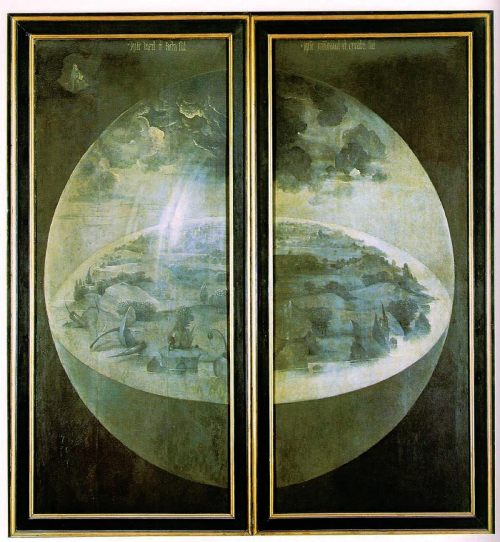Eco: From Adam to Confusio Linguarum
by Estéban Trujillo de Gutiérrez

Outer panels of Hieronymus Bosch, The Garden of Earthly Delights, 1480-1505, held in the Prado, Accession number P02823. A helpful analysis has been posted by Dr. Sally Hickson on the site of the Khan Academy. This work is in the public domain in its country of origin and other countries where the copyright term is the life of the author plus 100 years or less.
Genesis 2, 10, 11
Our story has an advantage over many others: it can begin at the Beginning.
God spoke before all things, and said, “Let there be light.” In this way, he created both heaven and earth; for with the utterance of the divine word, “there was light” (Genesis 1:3-4).
Thus Creation itself arose through an act of speech; it is only by giving things their names that he created them and gave them ontological status: “And God called the light Day and the darkness He called Night . . . And God called the firmament Heaven” (1:5, 8).
In Genesis 2:16-17, the Lord speaks to man for the first time, putting at his disposal all the goods in the earthly paradise, commanding him, however, not to eat of the fruit of the tree of the knowledge of good and evil.
We are not told in what language God spoke to Adam. Tradition has pictured it as a sort of language of interior illumination, in which God, as in other episodes of the Bible, expresses himself by thunderclaps and lightening.
If we are to understand it this way, we must think of a language which, although it is not translatable into any known idiom, is still, through a special grace or dispensation, comprehensible to its hearer.
It is at this point, and only at this point (2:19ff), that “out of the ground the Lord God formed every beast of the field, and every fowl of the air; and brought them unto Adam to see what he would call them.”
The interpretation of this passage is an extremely delicate matter. Clearly we are here in the presence of a motif, common in other religions and mythologies–that of the nomothete, the name-giver, the creator of language.
Yet it is not at all clear on what basis Adam actually chose the names he gave to the animals. The version in the Vulgate, the source for European culture’s understanding of the passage, does little to resolve this mystery.
The Vulgate has Adam calling the various animals “nominibus sui,” which we can only translate, “by their own names.” The King James version does not help us any more: “Whatsoever Adam called every living creature, that was the name thereof.”
But Adam might have called the animals “by their own names” in two senses. Either he gave them the names that, by some extra-linguistic right, were already due to them, or he gave them those names we still use on the basis of a convention initiated by Adam.
In other words, the names that Adam gave the animals are either the names that each animal intrinsically ought to have been given, or simply the names that the nomothete arbitrarily and ad placitum decided to give to them.
From this difficulty, we pass to Genesis 2:23. Here Adam sees Eve for the first time; and here, for the first time, the reader hears Adam’s actual words. In the King James version, Adam is quoted as saying: “This is now bone of my bones, and flesh of my flesh: she shall be called Woman . . .”
In the Vulgate the name is virago (a translation from the Hebrew isshà, the feminine of ish, “man.” If we take Adam’s use of virago together with the fact that, in Genesis 3:20, he calls his wife Eve, meaning “life,” because “she was the mother of all living,” it is evident that we are faced with names that are not arbitrary, but rather–at least etymologically–“right.”
The linguistic theme is taken up once more, this time in a very explicit fashion, in Genesis 11:1. We are told that after the Flood, “the whole earth was of one language, and of one speech.”
Yet men in their vanity conceived a desire to rival the Lord, and thus to erect a tower that would reach up to the heavens. To punish their pride and to put a stop to the construction of their tower, the Lord thought:
“Go to, let us go down, and there confound their language, that they may not understand one another’s speech . . . . Therefore is the name of it called Babel; because the Lord did there confound the language of all the earth: and from thence did the Lord scatter them abroad upon the face of all the earth” (Genesis 11:7, 9).
In the opinion of various Arab authors (cf. Borst, 1957-63: I, II, 9), the confusion was due to the trauma induced by the sight, terrifying no doubt, of the collapse of the tower. This really changes nothing: the biblical story, as well as the partially divergent accounts of other mythologies, simply serves to establish the fact that different languages exist in the world.”
Umberto Eco, The Search for the Perfect Language, translated by James Fentress, Blackwell. Oxford, 1995, pp. 7-9.
